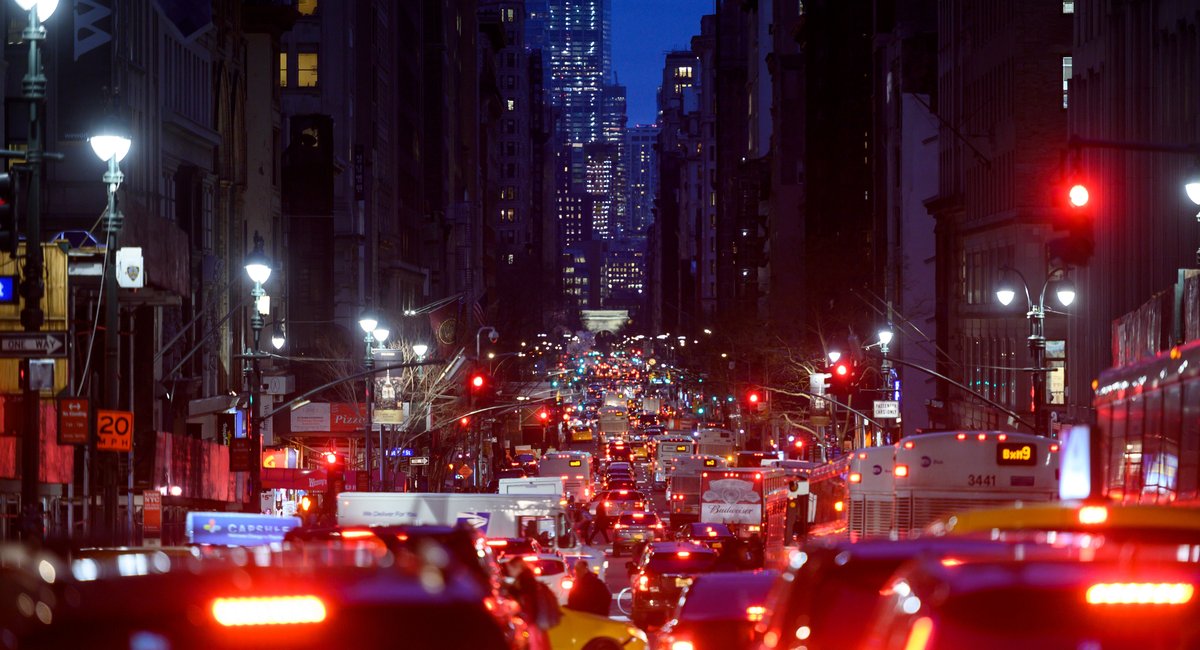State lawmakers are considering reducing the $15 base fee for congestion pricing in order to convince Gov. Kathy Hochul to unfreeze the program — but experts say that process could be moot if former President Donald Trump returns to the White House and makes good on his promise to kill the Manhattan tolls.
State senators confirmed to Gothamist that they’re discussing a Goldilocks price for the tolls that’s low enough for Hochul to accept but high enough to raise sufficient money for the cash-strapped MTA. The talks were first reported by the New York Times.
“My colleagues and I have been talking informally about whether we would accept a lower price point. I think the answer is yes,” said state Sen. Brad Hoylman-Sigal, who represents Manhattan’s West Side. “Nobody’s wedded to $15. We are wedded to the improvements that congestion pricing will provide for mass transit or safety on our streets for cleaner air.”
Hoylman-Sigal didn’t share what price he thinks would be right, but said he’d push for “dynamic pricing,” meaning tolls that would increase or decrease based on the amount of gridlock in Manhattan.
To change the congestion fee this year, Hochul might have to call the Legislature back to Albany for a special session to amend the 2019 law that authorized the program. Such a move would restart aspects of the approval process for congestion pricing. The program already underwent rigorous analysis from traffic analysts, which dragged on for more than five years. The current legislation requires the tolls to bring in $1 billion a year for MTA construction projects. That threshold would need to be reduced in order for the toll price to drop.
If lawmakers were to lower the revenue requirements for congestion pricing, they’d also have to come up with new funding for the MTA to make up the difference. Hochul’s pause of the tolls forced the MTA to shelve $16.5 billion worth of transit upgrades.
And any change to the $15 base price would need approval from the MTA board, which legal experts say would require a 60-day public comment period. Then, the Federal Highway Administration would need to review and sign off on any effects to traffic that would come with the amended pricing structure.
That process could drag into next year — or even longer, said Michael Gerrard, a professor and director of the Sabin Center for Climate Change Law at Columbia Law School. He is preparing to file a lawsuit against Hochul for pausing congestion pricing only weeks before the tolls were to be turned on.
“If the price points are much lower, or they make other significant changes to the program, they may have to redo the environmental analysis,” Gerrard said.
All those bureaucratic hurdles increase the likelihood the fate of congestion pricing could be determined by whoever is in the White House in 2025.
In May — less than two weeks before Hochul paused congestion pricing — Trump promised on social media to “TERMINATE Congestion Pricing in my FIRST WEEK back in Office!!”
Hoylman-Sigal said he wants to ensure the tolls — no matter how much they cost — launch before January in case Trump wins and tries to make good on his promise.
The right congestion price
Elected officials and experts didn’t have a clear answer on what price would meet congestion pricing’s goal to discourage drivers and meaningfully reduce gridlock in Manhattan south of 60th Street.
During a briefing on Tuesday, Hochul told reporters that “$15 on top of everybody’s expenses for groceries and everything is going to cost more – it’s just not the right time.”
Traffic analyst Bruce Schaller acknowledged that $5 or $6 for the tolls has less sticker shock than the $15 fee approved by the MTA — but those smaller amounts would significantly reduce the funding the program is supposed to provide for transit improvements.
“Fifteen dollars will get your attention, but it also raises three times as much money as $5 would. And that was the whole point,” Schaller said.
State Sen. Liz Krueger, who represents part of the congestion zone, said she’d be open to a different fee, but argued it would still need to raise $1 billion a year for the MTA. She said Hochul hasn’t yet offered a new price.
“If she believes there is an alternative that can move forward with lower tolls for some [drivers] at different hours, whatever, as long as the whole package continues to work,” said Krueger, who chairs the Senate Finance Committee. “I’m not saying I wouldn’t consider it, but so far she hasn’t offered any.”
State Sen. Jabari Brisport of Brooklyn, who supported congestion pricing, said the mad scramble prompted by Hochul’s pause of the tolls is absurd.
“It’s frustrating to try and rejigger it on the fly, given that the numbers that we had for congestion pricing were arrived at over the course of many years with endless studies, community feedback,” said Brisport. “To start tossing out other numbers and other ideas without affording those ideas the same number of years and pages and pages of studies and community feedback is irresponsible.”
